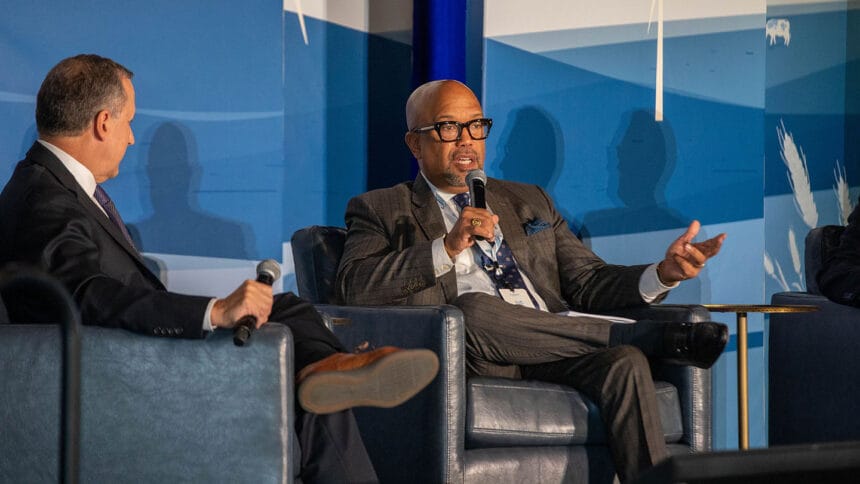
The government and providers must invest at an unprecedented level to confront the workforce problems dogging the skilled nursing sector, stressed a speaker at Wednesday’s Sanford Health Summit on the Future of Rural Health Care.
Clifton Porter II, senior vice president of government affairs for the American Health Care Association/National Center for Assisted Living, envisions a shake-up akin to President Franklin D. Roosevelt’s Depression-era New Deal.
“We need a massive commitment from our government to solve this problem,” Porter told an audience in Sioux Falls, SD. “We see the direction that the population is going, we see the direction that our system is going, and essentially we’re not doing much. I think it’s important for us to really think big on this issue. … And I think if we get serious about this, we can solve the problem.”
A $75 million investment in nursing home staff recruitment connected to a proposed federal minimum staffing mandate won’t make a dent in the staffing needs of rural nursing homes, he noted. In an earlier summit session Wednesday, AHCA/NCAL President and CEO Mark Parkinson said that funding, used efficiently, would result in only 750 RN degrees over five years, while the proposed minimum staffing rule requires the hiring of 22,000 RNs.
Telehealth alternative
The proposed staffing mandate, introduced Sept. 1, was criticized by summit speakers for being heavy handed and unrealistic. Porter said his organization is supporting legislative alternatives to the mandate, including the use of telehealth, to address the shortage of registered nurses.
A registered nurse could provide consultative needs remotely in not only rural but urban care settings, Porter pointed out.
“Why not allow telehealth consultation in those facilities… and allow that to meet the standard to ultimately improve quality of care?” he posed.
To that end, he said it is important to continue building momentum around the extension of pandemic telehealth waivers beyond their 2025 expiration date, especially with Congress lacking a Speaker of the House and the nation heading into a presidential election year.
“[Telehealth] is a pretty noncontroversial add-on that could actually benefit a lot of people,” Porter said.
Congress to the rescue?
Similarly, there are actions Congress can take to streamline the immigration system, allowing more trained clinicians to enter the United States workforce, said Porter and fellow session speaker Travis Robey, JD, vice president of political affairs at the American Hospital Association.
The issue of immigration is frustrating, because the “macropolitics of this are getting away getting in the way of common sense,” Porter said.
It’s difficult to have a bipartisan compromise on legal immigration in the context of healthcare because it tends to get bogged down in border security, Robey agreed. But one key measure, the Conrad 30 Waiver Program, would allow states to get visa requirement waivers for US-trained, foreign born physicians who wish to practice in underserved communities. Robey also foresees the reintroduction of the Healthcare Workforce Resilience Act, which would ease the bottleneck on foreign nurse visas.
Also in the session, Porter laid out AHCA’s current goals toward regulatory relief for short-staffed nursing home operators, including what he said is promising legislation that would allow the industry to create programs to train and certify its own direct caregivers. Additionally, the organization is supporting the reintroduction of a pandemic-era clinical position — the TNA, or temporary nursing assistant — as a potential pipeline and career path for industry caregivers.
But Porter said he hoped CMS would reconsider making a final rule of the proposed staffing mandate after it considers input from the nursing home industry and other providers during a 60-day comment period set to end Nov. 6.
“All of our members and many interested parties are commenting about the implications of this policy. Obviously, it doesn’t just impact nursing homes,” he said. “Hopefully, the concerns that have been elevated will be considered.”




